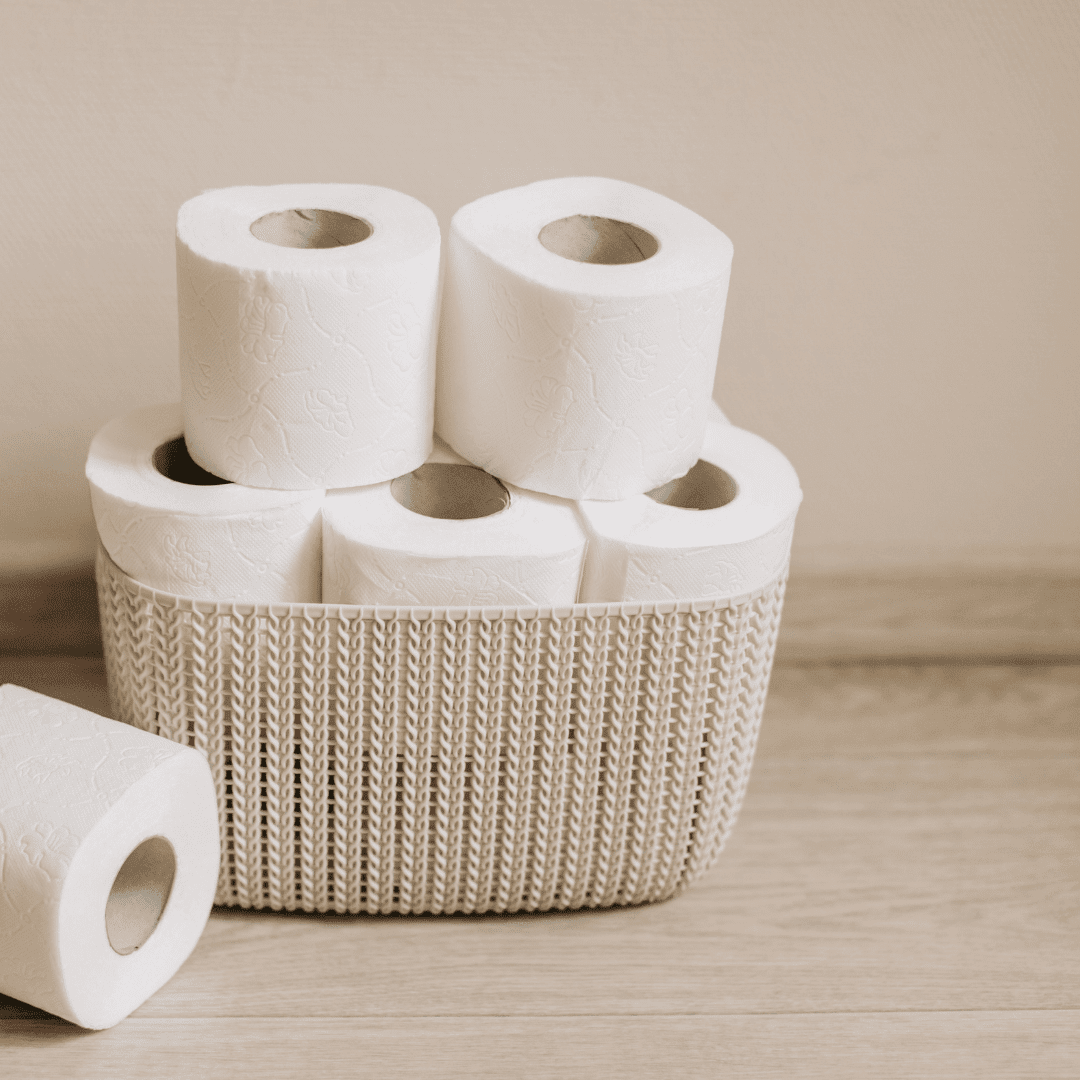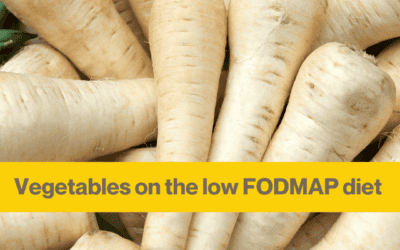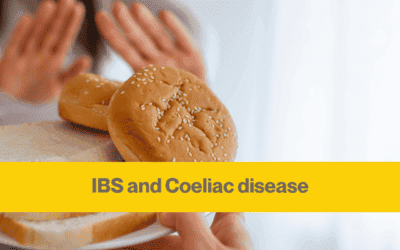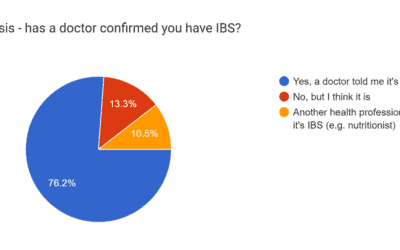If you struggle with Irritable Bowel Syndrome (IBS), then you’ll know just how frustrating and limiting it can be at times.
If you’re like my clients, you may have already tried multiple elimination diets or supplements to help relieve your symptoms but nothing seems to work.
It’s easy to feel overwhelmed by all the tips out there, but there are some simple changes you can make that may have a positive impact on your digestion. In this article, I’ll talk about 10 bad habits that may be contributing to IBS.
Let’s talk about how you can take charge of your symptoms and start feeling better today!
10 bad habits contributing to IBS
Here are 10 bad habits that may be contributing to the symptoms of IBS:
1. Eating too fast
If you’re eating on the go all the time and eating whilst distracted you’re less likely to be ready to digest your food. Make time to sit at a table so your body is upright, chew your food well, and take some deep breaths to calm down before you start eating.
It may seem obvious, but here are some tips on how to chew your food properly:
✅Take small bites of food, then chew each bite thoroughly before swallowing.
✅Avoid eating while distracted (working or watching TV). Your brain needs time to send the signal to your stomach that you’ve had enough to eat, so you’re distracted and eating quickly, this process is likely to be affected. Listen to Episode 2 of the IBS podcast Inside Knowledge for more tips on mindful eating.
2. Not chewing food properly
Chewing food properly can be one of the best ways to improve digestion. Chewing food thoroughly helps you to feel full and satisfied, which in turn can help you avoid overeating.
Chewing food properly also helps you to absorb nutrients from the foods you eat. When you don’t chew enough, your body will have a harder time extracting the vitamins and minerals from your meals.
Finally, chewing food properly can help prevent bloating and heartburn, two common digestive issues experienced by IBS sufferers!
You can also read my blog for more details on how chewing helps IBS

3. Irregular eating patterns – Eating big meals, or going too long without food
When you eat big meals high in protein, fat, or calories in a large meal, it can cause slow digestion and may cause bloating and discomfort.
People with IBS may find that fasting or long gaps between meals can cause cramping or colicky-type pains. If you leave too long between meals you’re more likely to overeat at the next meal.
If you eat too much fibre at once (a large salad with lots of raw vegetables over a short period of time) gas and bloating can be another issue.
4. Alcohol can contribute to IBS
Alcohol can bring on the symptoms of IBS if you’re not careful. Alcohol is a diuretic and it can cause dehydration, making your stomach feel worse. Alcoholic drinks can also irritate your digestive system, causing pain and bloating.
If you do choose to drink, try not to go overboard! While one glass of wine may be fine for some people who tolerate alcohol well.
Too much booze could lead not only to indigestion but also nausea or vomiting when combined with little to no food intake during drinking sessions, resulting in more discomfort the following day.
5. Ignoring the urge to poo when you need to
One of the worst habits that can contribute to IBS is ignoring the urge to poo when you need to. It’s important to listen to your body and go when you feel the need.
Don’t hold it in! Whenever you feel the urge for a bowel movement try to go straight away. Even if you’re not at home in your normal toilet.
Don’t wait until getting to work or school if there’s a toilet available where you are right now, because then you’ll have to hold it in, and by the time you set off out the door, it will be too late. It’s understandable that you might not want your work colleagues to know you’re having issues with your bowel movements, but holding it in and ignoring the messages from your body to the brain may lead to issues with pelvic floor dysfunction…
6. Chewing gum, and fizzy drinks
Chewing gum and drinking fizzy drinks can cause bloating and excessive air. As you chew, you swallow a lot of air which can lead to symptoms of IBS. Try not to chew gum when you’re in a hurry or stressed.
You may find that cutting down on how often you drink fizzy drinks helps with reducing bloat too! The carbonation causes a gas build-up in the stomach, leading to symptoms such as bloating and cramping.

7. Not dealing with stress
Stress can cause symptoms of IBS, such as abdominal cramping, bloating, and diarrhoea, and ignoring is one of the most common IBS mistakes I see.
Repeated studies have found that stress affects your digestion. When we’re anxious or worried over a long time these feelings can:
- change the gut motility (how quickly food moves through you)
- Make the gut more ‘leaky’ (so you’re more likely to react to foods you eat)
- reduce blood flow to the gut
- Increase sense of pain or sensitivity in digestion
- negatively affect the gut microbes
Stress could flare up the symptoms you already have, making your IBS worse. If you find yourself struggling to implement stress management techniques, try to get help from professionals such as talking therapy, counselling, acupuncture, mindfulness experts or yoga. Finding ways to combat stress will not only help reduce flares, it could help improve your sleep, mood, and relationships.
Chronic stress over an extended period of time may exacerbate an existing IBS condition, making it more difficult for you to find relief through natural means like diet and lifestyle changes
8. Fibre (too much / not enough) can cause IBS
Fruit, vegetables, and whole grains are good sources of fibre, but you can get digestive issues if you eat too much or too little.
If your diet contains an excess of fibre, you may experience bloating and gas as a result of the fermentation by your gut bacteria.
Most people aren’t eating enough. A daily intake of around 30g a day grams is recommended but many people consume less than that amount.
The best way to increase your daily fibre intake is to eat a variety of foods with slow-release fibre like whole grains or beans instead of refined grains like white bread.
9. Eating late at night – may cause reflux and/or reduced quality of sleep
If you eat late at night, you may be contributing to poor sleep, acid reflux, regurgitation, and bloating. If you’re in the habit of eating late at night it could result in higher levels of blood glucose, insulin, and cholesterol because our body doesn’t digest food as well late at night.
If your goal is to have a healthier gut, it may be beneficial to change your late-night eating habits.
Eating too close to bedtime can cause reflux, which is the upward flow of stomach acid into your eosophagus. Ensure your last meal is 3 hours before bedtime to help prevent reflux by keeping food from sitting too long in your stomach. If eating late at night works for you, try eating smaller meals throughout the day instead of one larger meal at night. This will help reduce night time indigestion issues and allow for better sleep quality throughout the night.
10. Overly restricting diet – Lack of diversity causing issues with digestion
Many of my clients start the Gut Reset on a very restrictive diet.
It’s very understandable that you’ve removed foods that might trigger your symptoms.
But the problems start when you keep to a very restrictive diet for too long.
By keeping more variety in your diet, you give your gut bacteria more opportunities to thrive. For example did you know aiming for 30 different plants a week is associated with better gut health.
It also makes it more likely you’ll be able to hit your nutrition targets like protein intake, fibre requirements, and all the vitamins and minerals we need to stay healthy.
If you’re not getting enough diversity in your diet, it’s likely to lead to poor gut health. These bacteria play an important role in maintaining a healthy gut, mood, and immune system.
Which of these bad habits contributing to IBS are you still doing?
Hopefully, this article has given you some thought on how to improve your IBS symptoms, whether by making small changes or addressing some of these larger issues head-on. I know that IBS can be a challenging topic, especially when it comes to changing your diet and lifestyle. But, the good news is that by taking steps to manage your symptoms in a healthy way, you may make things more manageable for yourself while living with IBS.
I help people with IBS get back to living life. Let’s work together to pinpoint the best route to get improvements in your digestion. As a nutritionist, I’ve helped hundreds of people find relief from their digestive symptoms. Through years of training and clinical experience, I have developed my Gut Reset to help people resolve their digestive issues like bloating, constipation, and IBS flare-ups.

IBS Nutritionist
Hi I'm Anna Mapson, registered Nutritional Therapist.
I help people with IBS and SIBO get control of unpredictable gut symptoms to find long term relief from painful and embarrassing IBS without restrictive dieting.
I can help you to:
- understand your digestion better, so you recognise your triggers
- eat a well balanced diet, with tasty meals that are simple to prepare
- reintroduce your trigger foods so you can get back to enjoying food again
Find more about my 3 month 1:1 Gut Reset programme
Low FODMAP Vegetables for IBS relief
Confused about which vegetables are low FODMAP? Dealing with IBS can throw some serious curveballs into your meal planning, right? But don't worry, you can still include lots of veg in your meals. I'm here to dish out some tasty tips on navigating the low FODMAP diet...
IBS and Coeliac Disease: A Guide to Understanding & Diagnosis
Are you confused about IBS and coeliac disease? Maybe you feel better without gluten in your diet, but you're not sure whether you've been tested for coeliac disease or not. The cross over between IBS and coeliac disease 1 in 4 people are misdiagnosed with IBS when...
The impact of IBS on daily life
The struggles of IBS: A new survey reveals the profound impact on daily life. I ran a survey with my audience about the impact of IBS, and the way Irritable Bowel Syndrome (IBS) affects your day-to-day lives is really clear. I already knew from my work with clients...




